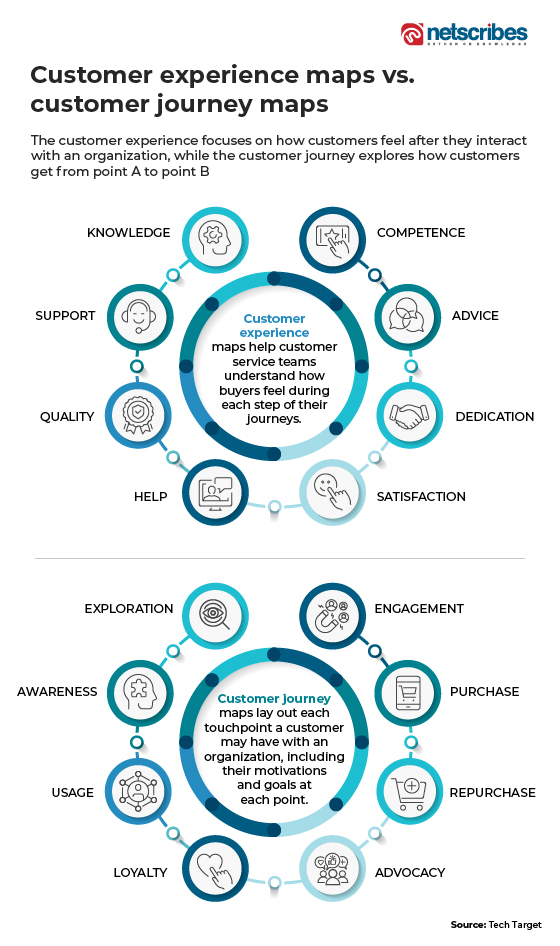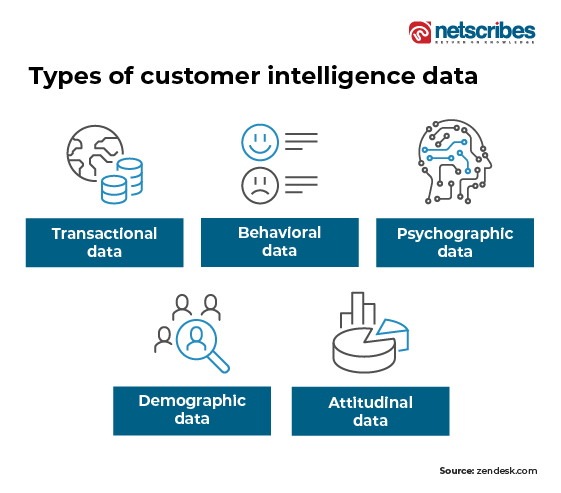Highlights
- Customer Intelligence (CI) is a strategy that involves collecting and analyzing data to understand customer behavior and preferences, thus enabling businesses to predict customer actions and tailor their offerings for an enhanced customer experience.
- It relies on diverse data types, including transactional, behavioral, psychographic, demographic, and attitudinal data, to build a comprehensive view of the customer.
- CI not only helps in creating personalized customer experiences but also provides businesses with a distinct competitive advantage by improving sales, fostering loyalty, guiding product development, and enhancing marketing strategies.
- Leveraging CI effectively means understanding the ‘Who’, ‘What’, ‘When’, and ‘Why’ behind customer interactions, paving the way for hyper-personalized campaigns and proactive customer journey mapping.
Customer intelligence involves collecting data to gain insights into customer behavior. This data helps businesses predict customer actions and enhance the overall customer experience. The process includes studying customers to gather intelligence data, ultimately leading to improved business outcomes. The key lies in understanding why customers behave the way they do and then leveraging these insights to refine strategies. The goal of collecting CI data is to use the information to personalize each customer’s experience.
Why customer intelligence should matter to your business
Customer intelligence introduces a novel strategy for enhancing customer success, support, experience, and marketing functions. It offers the chance to strengthen relationships by resolving issues and anticipating customers’ needs. PwC’s research found that ’good customer experience minimizes friction, maximizes speed and efficiency, and maintains a human element, embedded within the automation, AI, or other technologies. It leaves consumers feeling heard, seen, and appreciated. It has a tangible impact that can be measured in dollars and cents.’

Decoding customer experience and journey
Customer intelligence (CI) helps understand customers’ positions in their buying process with regard to awareness, consideration, decision, and post-purchase expectations. It’s important to note that the customer’s journey (CJ) is distinct from the customer experience (CX), although they overlap.
CX reflects the overall perception formed by customers through interactions with a brand. On the other hand, CJ, a subset of CX, outlines the sequential touchpoints in a customer’s interaction with a brand. Essentially, CX is proactive, focusing on customer needs, while CJ is reactive, guiding customers through distinct stages of the purchase journey.

Types of data that you need to build effective customer intelligence
Effective customer intelligence relies on gathering and analyzing various data types to gain insights into customer behavior, preferences, and needs. Here are some key types of data that are crucial for building comprehensive customer intelligence:
- Transactional data:
Details of past transactions, including the products or services purchased, frequency of purchases, and average transaction value, are crucial for understanding buying patterns. - Behavioral data:
Purchase history, product usage patterns, browsing behavior, and interactions with website or app offer insights into customer behavior and preferences. - Psychographic data:
Lifestyle choices, values, interests, hobbies, and personality traits help create a more nuanced profile of your customers. - Demographic data:
Age, gender, income, education level, marital status, and other demographic information provide a basic understanding of your customer base. - Attitudinal data:
Customer satisfaction, pain points, purchase criteria, customer sentiment, and product and branding desirability.

How customer intelligence can give your business an edge
By decoding customer behavior and understanding their needs, CI hands you a distinct advantage over your competitors. The following are the ways how CI can give your business an advantage over others:
1. Sales powerhouse: Customer intelligence (CI) isn’t just about understanding your customers; it’s about boosting your bottom line. By optimizing marketing campaigns and improving transparency into ROI, CI fuels sales efficiency and effectiveness, helping you reach the right customers with the right message at the right time.
2. Loyalty magnet: Building lasting relationships is key to success. CI empowers you to strengthen customer loyalty by uncovering their needs and expectations. This translates to personalized service, targeted experiences, and ultimately, happy customers who keep coming back for more.
3. Data-driven product decisions: No more guessing games. CI delivers actionable insights to guide your product development. Analyze customer preferences, understand usage patterns, and identify growth opportunities. This data-driven approach ensures your products stay relevant and resonate with your audience.
4. Marketing mastermind: Predict campaign effectiveness, optimize cross-channel strategies, and fuel cross-sell and upsell opportunities. CI lets you anticipate customer behavior and tailor your marketing efforts for maximum impact.
6. Market agility in a dynamic landscape: The retail and e-commerce worlds move fast. CI keeps you ahead of the curve by tracking evolving trends and customer preferences. Adapt your offerings, stay relevant, and outshine your competitors in this ever-changing marketplace.

Leveraging CI to answer ‘Who’, ‘What’, ‘When’, and ‘Why
Customer intelligence applies to multiple use cases, including:
Mapping customer journey:
By tracking customers’ every step, from curious browsing to joyful purchases, customer intelligence paints a detailed picture of the journey they take. From clicks and purchases to social media chatter, every data point is a clue to unravelling their buying decisions.
With this insider knowledge, businesses can craft precise marketing campaigns that speak directly to customers’ needs and desires.
Behavioral insights:
Dive into customer data – past purchases, online habits, and social media engagements. This peek into customer behavior empowers businesses to customize marketing, products, and service, aligning perfectly with audiences’ needs and expectations.
Spotting attrition early:
Businesses can detect signs of customer dissatisfaction and potential defection by closely monitoring interactions and engagement. Identifying patterns in behaviors linked to churn, such as decreasing purchase frequency, enables proactive retention efforts through targeted campaigns and personalized incentives.
Hyper-personalized campaigns:
Imagine sending birthday offers based on past purchases, or recommending products customers didn’t know they needed but secretly craved. CI helps segment audiences, understand preferences, and craft campaigns that feel like personal love letters.
Beyond the crystal ball
The horizon of customer intelligence (CI) is filled with opportunities. Embracing these emerging trends and placing ethical considerations at the forefront allows businesses to harness the potential of customer intelligence. This, in turn, facilitates the creation of stronger connections, the delivery of personalized experiences, and the attainment of unprecedented success. It’s crucial to recognize that customers aren’t mere data points; they constitute the essence of your business. Instead of using CI for control, leverage it to comprehend, connect, and ultimately, enhance your service to them.
Netscribes boasts decades of expertise in delivering extensive market research services centered around providing valuable customer intelligence solutions. If you’re eager to witness our proficiency in action, reach out to us.
FAQs
Customer Intelligence involves collecting and analyzing various types of data about customers to understand their behavior, preferences, and needs. This understanding helps businesses tailor their strategies to enhance the customer experience and predict future actions.
It offers a novel approach to improving customer success, support, experience, and marketing efforts. According to PwC's research, a good customer experience has a measurable impact on revenue, enhancing relationships by addressing and anticipating customer needs effectively.
CI provides insights into the customer's journey, including their awareness, consideration, and post-purchase expectations, differentiating between the proactive customer experience (CX) and the reactive customer journey (CJ).
Effective CI requires transactional, behavioral, psychographic, demographic, and attitudinal data. This diverse data collection enables a comprehensive understanding of customer behavior and preferences.
By understanding customer needs and behaviors, CI enables businesses to boost sales efficiency, enhance customer loyalty, make data-driven product decisions, optimize marketing campaigns, and maintain market agility in a dynamic landscape.






